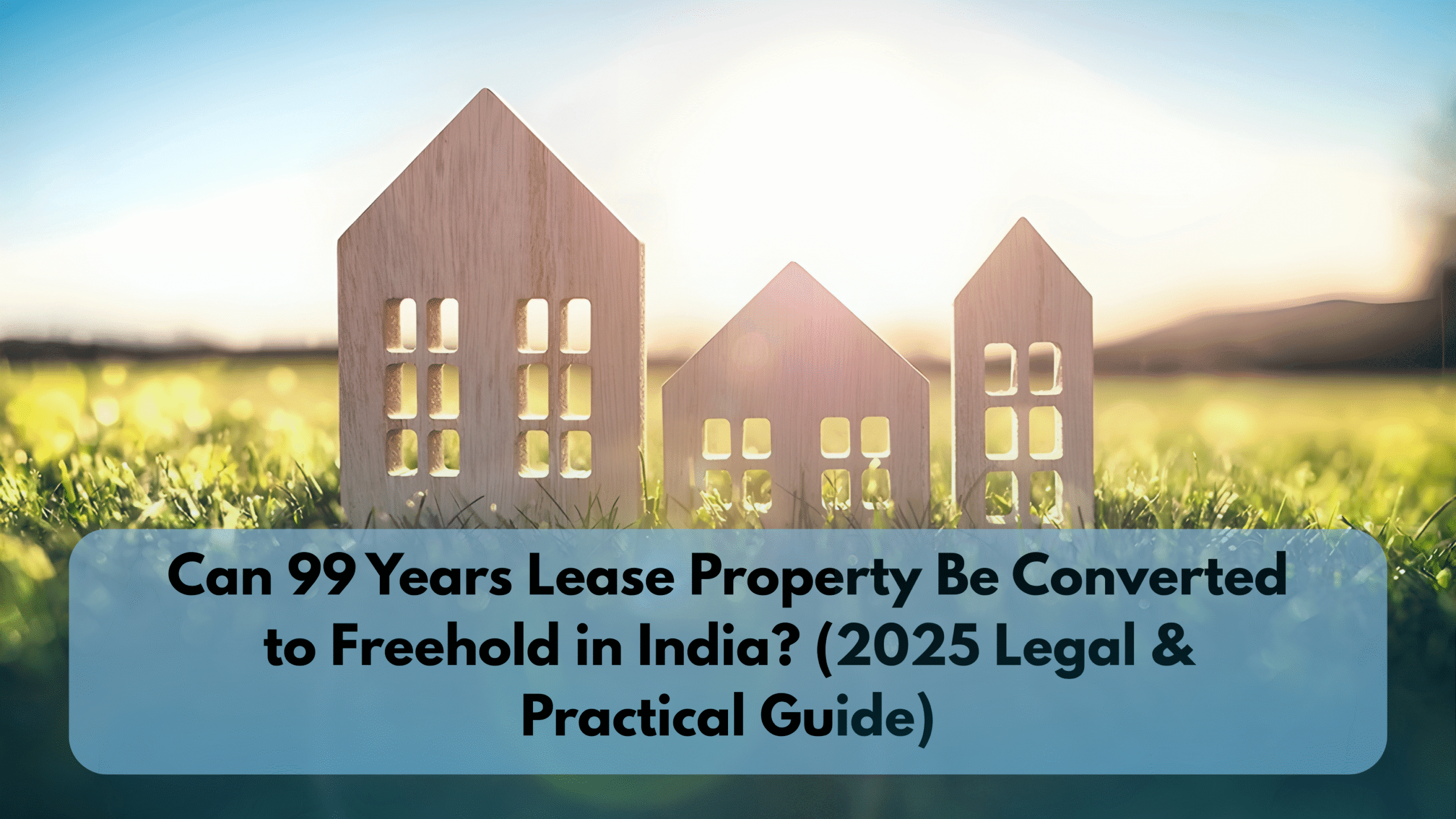Can 99 Years Lease Property Be Converted to Freehold in India? (2025 Legal & Practical Guide)
If you are wondering, “Can 99 years lease property be converted to freehold in India?”, the answer is usually yes, but it depends on the authority that owns the land and the state’s regulations.
For instance, in Delhi, both the Delhi Development Authority (DDA) and the Land & Development Office (L&DO) have well-defined procedures to convert leasehold properties into freehold by paying certain charges and submitting the required documents. However, in regions like Noida and Greater Noida, properties remain largely on leasehold, and a uniform conversion scheme like Delhi’s is not available.
This makes it essential for property owners to check the specific policy of their development authority before beginning the conversion process.
1. Understanding Leasehold vs Freehold
Leasehold Property (99 years): You are granted rights to use the property for the lease period, but the actual ownership of land rests with the government or development authority. After the lease term expires, the lease must be renewed, usually with new terms and charges.
Freehold Property: Ownership is absolute and perpetual. You hold both the building and the land rights, giving you greater freedom to sell, transfer, or mortgage the property without seeking prior approval from the lessor (though local building rules still apply).
Converting a 99-year leasehold property into freehold provides security, market value appreciation, and hassle-free ownership.
2. Where Conversion Is Allowed in India
1. Delhi Development Authority (DDA)
DDA has a structured conversion scheme. Property owners can apply online or offline, clear dues such as ground rent, pay the notified conversion charges, and execute a conveyance deed to become freehold owners.
2. Land & Development Office (L&DO)
The L&DO also permits leasehold-to-freehold conversion for properties under its jurisdiction. The process involves applications, submission of indemnity bonds, and payment of conversion charges. However, as of mid-2025, conversions have been temporarily paused pending new Standard Operating Procedures (SOPs).
3. Noida and Greater Noida
Unlike Delhi, these regions still primarily operate on leasehold models. Homebuyers and resident associations have been demanding freehold rights, but there is no comprehensive conversion scheme yet.
3. Who Can Apply for Conversion?
Although criteria differ by authority, general conditions include:
Clear title and complete documentation of the property.
No outstanding dues like ground rent, misuse penalties, or restoration charges.
The property must fall under categories declared eligible for conversion.
In case of unauthorized construction, penalties or compounding fees may apply.
4. Step-by-Step Process for Conversion (Delhi Example)
Identify the land authority mentioned in your original lease deed or allotment letter.
Check scheme availability on the authority’s website (DDA/L&DO regularly publish updated notifications).
Prepare documents – identity proofs, allotment letter, possession letter, latest property tax receipt, and complete chain of ownership papers.
Clear all dues related to ground rent, misuse, or penalties.
Pay conversion charges as per notified rates.
Submit application with the authority (online or at the office).
Approval & conveyance deed execution – once approved, the deed is registered with the Sub-Registrar, and the property officially becomes freehold.
Mutation – update ownership details with municipal authorities for tax and record purposes.
5. Costs Involved
Conversion charges – calculated based on land size and authority’s rates.
Outstanding dues – ground rent arrears, misuse charges, or penalties.
Stamp duty & registration fees – payable at the time of registering the conveyance deed (state-specific).
6. Advantages of Converting to Freehold
✔ Full ownership with perpetual rights.
✔ Easier resale, mortgage, and transfer without approvals.
✔ Higher property valuation and better marketability.
✔ Freedom from renewal worries at the end of the lease period.
7. Disadvantages or Challenges
✘ One-time financial burden (conversion fee + stamp duty).
✘ Paperwork and documentation can be time-consuming.
✘ In some areas (like L&DO), policies may be temporarily suspended.
✘ Not available everywhere in India (e.g., Noida lacks a full-fledged scheme).
8. Final Thoughts
So, can 99 years lease property be converted to freehold in India? The answer is yes, provided the respective land authority has a conversion scheme in place. In Delhi, the process is structured and fairly common, while in regions like Noida, conversion is not universally available yet.
If you own a leasehold property, it’s always wise to:
Check the latest notifications on your authority’s website,
Prepare your documents and clear dues, and
Apply for conversion at the earliest to secure permanent ownership rights.
9. FAQs
Q1: Can 99 years lease property be converted to freehold in India?
Yes, but only if the land-owning authority offers such a scheme. Delhi (DDA and L&DO) provides the option, but other regions may not.
Q2: How much does it cost to convert a leasehold property into freehold?
Costs vary by authority and property size but include conversion charges, clearance of dues, and state stamp duty/registration fees.
Q3: Can apartments in group housing societies be converted?
Yes, but in some cases, the housing society itself must complete the primary conversion steps before individual flat owners can apply.
Q4: Is it mandatory to convert a leasehold property into freehold?
Not mandatory, but freehold provides complete ownership security and easier transactions.
Q5: What happens if the 99-year lease ends without conversion?
The property reverts to the lessor unless renewed. That’s why converting into freehold is often considered a safer option.

